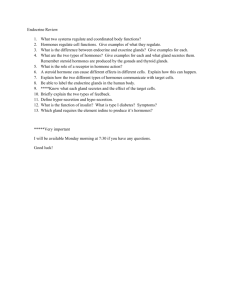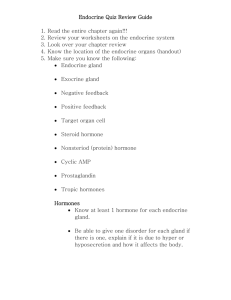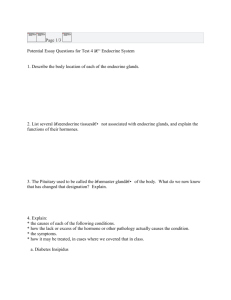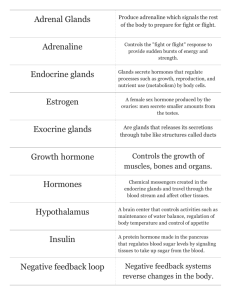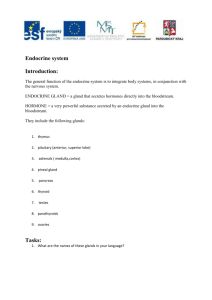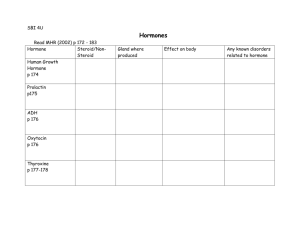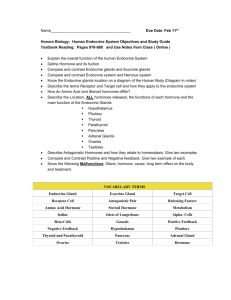The Endocrine System
advertisement
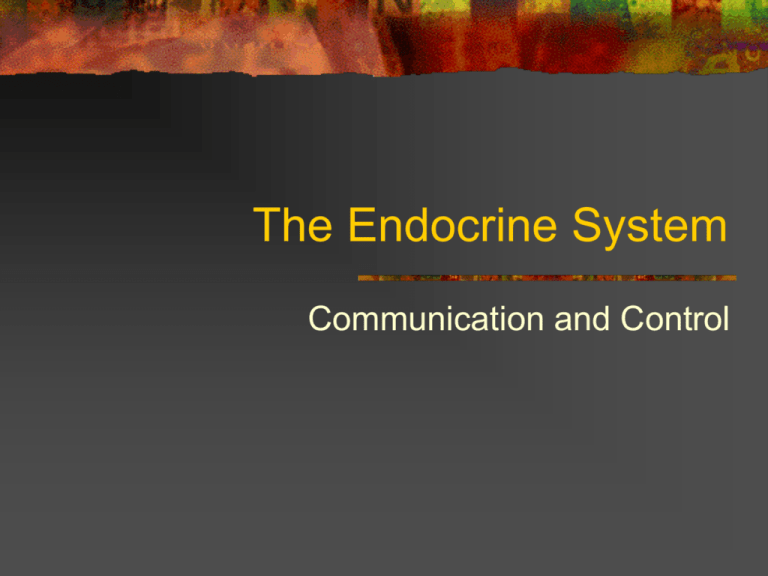
The Endocrine System Communication and Control Endocrine System Same general functions as the nervous system: Nervous system – rapid, brief Endocrine system – slow, longer-lasting Intro Words to Know Tropic hormone – hormone that stimulates another endocrine gland to grow and secrete its hormones Melanocyte – specialized cells in the pigment layer that produces melanin (brown skin pigment) Diuretic – substance that promotes or stimulates the production of urine Antidiuretic hormone – hormone that accelerates reabsorption of water (reduces production of urine) Objectives Distinguish between endocrine and exocrine glands. Define the terms hormone and prostaglandin. Identify and locate the primary endocrine glands and list the major hormones produced by each gland. Endocrine and Exocrine Glands Endocrine – ductless; secrete hormones directly into bloodstream Component of endocrine system Exocrine – discharge secretions into ducts; sweat glands, salivary glands Does not belong to endocrine system Hormones and Prostaglandins Hormones – chemicals secreted into intercellular spaces Intercellular spaces..diffuse directly into blood…target organ cell (hormone molecule binds to receptor cell) Prostaglandins – tissue hormone, diffuses only a short distance Influence production of cyclic AMP? Influence respiration, blood pressure, gastrointestinal secretions, and the reproductive system Primary Endocrine Glands Pituitary 1. Cranial cavity 2. In small depression of sphenoid bone called the sella turcica 3. Anterior lobe – growth hormone, TSH, adrenocorticotropic hormone (ACTH), FSH, LH, melanocyte-stimulating hormone, prolactin 4. Posterior lobe – antidiuretic hormone and oxytocin 5. Often called “master gland”, but its secretions are actually controlled by the hypothalamus Thyroid Gland Lies in neck, just below the larynx Secretes thyroxine (T4), triiodothyronine (T3), and calcitonin Increases body’s metabolic rate and helps maintain homeostasis of blood calcium (decreases calcium concentration) Parathyroid Glands Four small glands on the back of the thyroid Secrete parathyroid hormone Increases calcium concentration in blood Adrenal Glands Over the top of each kidney Adrenal cortex – mineralocorticoids, glucocorticoids, and small amounts of sex hormones Adrenal medulla – epinephrine and norepinephrine Plays an essential part in maintaining blood pressure Islands of Langerhans Clumps of cells scattered among pancreatic cells Alpha cells secrete glucagon Beta cells secrete insulin Insulin and glucagon are antagonists Sex Glands Ovaries of female (back of pelvic cavity) secrete estrogen and progesterone Testes of male (in scrotum) secrete testosterone Thymus In mediastinum Not regulated by the pituitary gland Secretes thymosin ( a group of several hormones) Essential role in the development and function of the immune system Placenta Temporary endocrine gland formed during pregnancy Secretes chorionic gonadotropin Pineal Gland Small cone-shaped gland Lies near the roof of the third ventricle of the brain Secretes melatonin (thought to be involved in regulating the onset of puberty and menstrual cycle in females) “Third eye” – receives and responds to sensory information from the optic nerves Helps regulate the body’s internal clock and sleep cycle Hypothalamus and Atria Hypothalamus (brain) – several releasing and inhibiting hormones that affect the hormone secretions of the anterior pituitary Controls temperature, appetite, and thirst Atria (heart) – secretes atrial natriuretic hormone (ANH) that regulates fluid and electrolyte homeostasis Objective Identify the principal functions of each major endocrine hormone and describe the conditions that may result from hypersecretion of hyposecretion. Refer to pages 345-347 in text. Objectives Describe the mechanisms of steroid and protein hormone action. Explain how negative and positive feedback mechanisms regulate the secretion of endocrine hormones. Define diabetes insipidus, diabetes mellitus, gigantism, goiter, cretinism, and glycosuria. Mechanisms of Hormone Action Protein hormones (first messengers) bind to receptors on the target cell membrane, triggering second messengers (such as cyclic AMP) to affect the cell’s activities Steroid hormones bind to receptor cells within the target cell nucleus and influence cell activity by acting on DNA Negative Feedback Mechanisms Negative – reverse the reaction of a change Example: Pancreas releases insulin in response to elevation of sugar level in the blood. Blood sugar levels then decrease, which then causes endocrine cells in the pancreas to cease the production and release of insulin. Positive Feedback Mechanisms Positive – amplify the change, uncommon Example: When labor begins, the cervix becomes distended and stimulates the synthesis of oxytocin, which stimulates the uterus to contract. As the contractions increase, the levels of oxytocin increase. The cycle is broken by the birth of the baby. Definitions Diabetes insipidus – caused by hyposecretion of antidiuretic hormone produced by the posterior lobe of the pituitary gland 1. Eliminate extremely large volumes of water each day 2. Severe thirst, dehydration, electrolyte imbalance Diabetes mellitus – Islets of Langerhans secrete too little insulin 1. Glucose cannot enter into cells, causing blood glucose to increase greatly 2. Excess sugar is filtered out of the blood into the kidneys to be lost along with urine. Gigantism – too much growth hormone is produced by the pituitary gland Goiter – painless enlargement of the thyroid gland caused by low dietary intake of iodine Iodine is necessary for the synthesis of thyroid hormones Cretinism – hyposecretion of thyroid hormones during the formative years Low metabolic rate, retarded growth and sexual development Frequently, mental retardation Glycosuria – excess sugar in the urine Occurs with diabetes mellitus (excess blood sugar is filtered out of the body by the kidneys to be transferred to urine)


